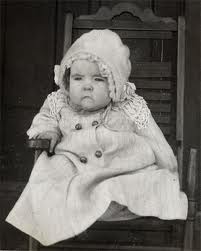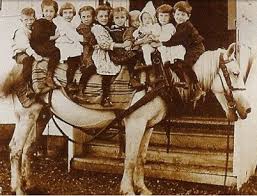Before every infant was required by law to be accounted for by public authorities, “baby farms,” unlicensed businesses where newborns, often the unwanted offspring of prostitutes, exchanged hands for a profit via shadowy doorstep adoptions, were prevalent. These babies were not often cared for well as they awaited “purchase,” and the ones who perished were usually buried surreptitiously on the grounds of the farms. It was a dark practice that led to numerous shocking scandals. One such adoption story which had an odd twist was covered in perplexingly upbeat fashion in the February 18, 1891 Brooklyn Daily Eagle. An excerpt:
“What is known as the ‘baby farm’ is not an entirely modern institution. Nor has it escaped its share of criticism; but it serves one excellent purpose in supplying babies at small cost to lonely couples which Providence has not blessed with children. The beauty of it is that there is a large stock to choose from and it is just as easy to obtain a bouncing little girl, with the customary blue eyes and golden hair, as it is to acquire title to a rosy, roaring and frolicsome boy. It is with keen appreciation of these advantages that Mrs. Huber of Lorimer street, this city, negotiated for a baby warranted to give satisfaction and, having taken it home, succeeded in convincing her husband that the visitor was his son and heir. Mr. Huber appears to be one of those gentle, confiding creatures who are quite willing to believe that the moon is made of green cheese, and it is absolutely certain that he would still be celebrating his newly acquired dignity as a ‘parent’ had not an unlooked for incident disturbed the serenity of his repose.
 A few days after the appearance of the crowing youngster at the Lorimer street domicile, Mr. Huber was surprised to find his quarters invaded by strangers. There was a hack in front of the door, and upstairs, in his wife’s room, was a dashing young woman who, strange to say, made claim to Mr. Huber’s baby, and announced her intention to take it away with her, kindly promising, however, to leave another infant in its place. It is, of course, unnecessary to submit that Mr. Huber did not immediately recognize the young woman as the mother of his child, and after settling this point to his own satisfaction, came to the conclusion that he was harboring a lunatic. It was in vain that he appealed to Mrs. Huber. That estimable person, instead of becoming highly indignant at the unexpected turn of affairs, was disposed to accept the situation in a philosophical mood, and sat on the edge of the sofa closely studying the pattern of the carpet. Finally the truth was told, and Mr. Huber then had the pleasure of ascertaining that while Mrs. Watson Schermerhorn had changed her mind and wanted her baby back, Mrs. Kate Burke, polite and obliging as she was, was willing to let her baby be exchanged for it.
A few days after the appearance of the crowing youngster at the Lorimer street domicile, Mr. Huber was surprised to find his quarters invaded by strangers. There was a hack in front of the door, and upstairs, in his wife’s room, was a dashing young woman who, strange to say, made claim to Mr. Huber’s baby, and announced her intention to take it away with her, kindly promising, however, to leave another infant in its place. It is, of course, unnecessary to submit that Mr. Huber did not immediately recognize the young woman as the mother of his child, and after settling this point to his own satisfaction, came to the conclusion that he was harboring a lunatic. It was in vain that he appealed to Mrs. Huber. That estimable person, instead of becoming highly indignant at the unexpected turn of affairs, was disposed to accept the situation in a philosophical mood, and sat on the edge of the sofa closely studying the pattern of the carpet. Finally the truth was told, and Mr. Huber then had the pleasure of ascertaining that while Mrs. Watson Schermerhorn had changed her mind and wanted her baby back, Mrs. Kate Burke, polite and obliging as she was, was willing to let her baby be exchanged for it.
We do not believe that people will be disposed severely to blame the wife for the deception of which she was guilty, because her desire to be proud possessor of a prattling baby was really pathetic. It was the consuming passion of her life, for, as she innocently puts it, ‘there can be no happiness when there is no baby.’ But would it not have been advisable to consult the husband before surreptitiously introducing the stranger into the household?”

